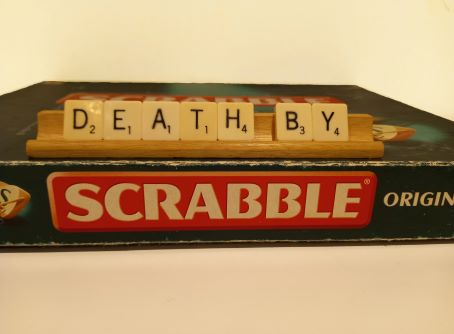The board game Scrabble was developed by Alfred Butts, an architect from New York. In 1933 he became unemployed during America’s Great Depression and decided to fill his time by creating a game that combined skill and luck. He noted the frequency of which letters were used in everyday language by counting letters on the pages of The New York Times. He named the game ‘Lexiko’, then ‘Criss-Cross Words’ and eventually in 1948, it was redesigned and renamed as Scrabble. It came to Great Britain in 1954. Mr Butts died in April 1993 so lived to see his game become immensely popular and a household name. Indeed, National Scrabble Day is celebrated on 13th April every year – Arthur Butt’s birthday!
I’ve played Scrabble since I was a child in the 1960s and have grown to love the challenge and unpredictability of the game. When smaller travel versions were produced (magnetic or clip on tiles), a set always came on holiday and helped us while away many a travel delay.
Since the recent pandemic, playing Scrabble has been a merciful temporary distraction from the dire news around the world and the incomprehensible statistics. For an hour or so we two, or sometimes three, were distracted by the complexities of the English language. We often remark on how the game has changed over the years, not so much the box, board, tiles and stand but the actual English language.
Collins Scrabble Dictionary is the official source of reference. Alas, our heavy thick tome gradually disintegrated due to constant use. Currently we’re tending to use a Scrabble Word Checker on our mobile phones which is considerably quicker and enables all players to check a word at the same time. All sorts of words are permitted now, if, according to the official Scrabble rules, words are regularly used including those listed as ‘archaic, obsolete, colloquial and slang’. Evidently every four to eight years, new frequently used words are added into the next Scrabble Dictionary edition, including some foreign words which have become common in the English spoken world.
Can you imagine in the 1960s or 70s trying to get away with any foreign words not to mention Scot’s oddities such as JO (loved one), NA (no) and you wouldn’t have had a chance of using QI (a Chinese vital force) or QIN (Chinese zither)! It defies belief that words such as QUIZZIFY (to quiz or question), ZA (slang for pizza), DIS (to insult) and CHAV (an uncultured youth!) are now perfectly acceptable.
Realistically if you are playing with friends you want to keep, it might be a good idea to set the ground rules about how far you are going to go with your vocabulary. Are you going to allow players to only use words for which they can provide a definition? Are players permitted to check a word if they write it down first? Would you concede to a player looking up a combination of letters in the hope that it is a word?
In professional scrabble the tiles are smooth so players can’t identify the letters or a blank by touch. Three minutes are allowed per turn and each player is given 25 minutes to complete their turns. The game is over after 54 minutes but both players are permitted one more play before totalling the final scores. A professional Scrabble score for two people is about 350.
Over several years, my husband and I have kept a running record of our scores so we can see at a glance who is on the winning streak. In the last couple of rounds there are often just a few points between us so although the game slows, the tension certainly rises! At this point we endeavour to outwit each other often referring to the ‘Two letter word list’ to dispose of those remaining tiles on the crowded board.
The results are declared, the winner smugly triumphant, the loser analysing the results to defend their honour. This usually includes pointing out that the majority of the key high scoring letters (Q, Z, X, J) only fell into the hands of his/her opponent and thus the loser didn’t have a chance but should be applauded for their perseverance despite this shortfall! It might be tempting for the loser (who reluctantly yields to doing the dishes), to squirt washing-up liquid in the winner’s eyes whilst stabbing them with the bread knife, but then there would be no chance for a revenge match, so yet again, Death by Scrabble is delayed……until the next game!


